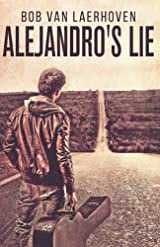New Book Alert: Alejandro's Lie by Bob Van Laerhove; An Honest and Absorbing Look At Imprisonment and PTSD In A Latin American Dictatorship
By Julie Sara Porter
Bookworm Reviews
Spoilers: M.G. Claybrook's satirical children's book for adults The Voyages of Gethsarade has the biting but very true line, "All revolutions begin the same way by not being paid."
Gethsarade, Claybrook's furry squirrel musician-turned-folk-hero protagonist, would find a revolutionary partner in Alejandro Juron, who would share that same sentiment. Alejandro is the (human in this case, not squirrel) protagonist of Alejandro's Lie, Bob Van Laerhoven political thriller about revolution in a Latin American country. It shows what happens when the marching, protests, and rebellions stop and the rebel is left older and alone with their thoughts.
It is 1983 in Valtaigo, Terreno, a fictional Latin American country. Alejandro has just been released from a prison that is so notorious that it is nicknamed The Last Supper, because "supper was the only meal that they gave you on your execution." Alejandro was the guitarist in the folk band, Aconcagua, led by the fiery and charismatic Victor Perez.
Alejandro struggles to adjust to life on the outside, refamiliarizing himself with places like the 'pigsty', Vaitago's slums and living under the military junta that has strict control over Terreno (with funding from the United States). He reunites with old friends, like Cristobal Vial, a former firebrand playing it safe as a university librarian and makes new friends, like Beatriz Candalti, a feminist who is separated and planning to divorce her abusive husband.
Alejandro's imprisonment has given him PTSD and a bitter cynical outlook. He also feels guilty about his own motives for becoming a musician/revolutionary and his actions that led to Vincent's arrest, imprisonment, and death.
Alejandro's Lie is an absorbing look at how a dictatorship affects the people and places surrounding it. Terreno is a fictional location but the impact of living under a tyranny can be clearly felt in the real world. This impact has been experienced by people from real Central and South American countries that have been ruined by dictators who have used various political leanings from Capitalism to Communism and backing from more powerful countries as means for control.
One character describes the situation in Terreno as "The wealthy are dancing the rumba in luxurious nightclubs, the poor grab leftovers in the garbage dumps….Terreno is a country of contradictions a d teeming with underground parties and resistance groups…rebel groups are smuggling in arms from Cuba...the middle class hesitates; the oligarchy has resolutely sided with the junta." It's a world that has been teetering on an abyss for a long time and barely needs a slight push before it falls off.
Alejandro's Lie is the type of book in which the author avoids making the setting beautiful to focus on the ugliness surrounding the characters. There are some detailed descriptions of nature, particularly when Beatriz flies a plane to a mountain location. However, they are very few. Most of the action is in Valtaigo, possibly a deliberate move by Van Laerhoven. The focus is on the dictatorship, so much so that everything in the country is centered around it. Even nature's beauty is tainted by the corrupt people in charge who want to destroy it. Terreno is a country filled with loss, regret, guilt, and forced complacency.
Those feelings overwhelm Alejandro as soon as he leaves The Last Supper and exacerbates his already growing PTSD. He suffers through the nightmarish memories of his imprisonment including starvation, torture, and manipulation. After leaving prison however, his experiences get worse.
Alejandro left a country that was devastated by a dictator. What he finds is a ruthless government still in power. The people's rights have only diminished further. Unfortunately, it has been so long that most people have lost the will to fight. There are some resistors, as Beatriz is involved in just such a cell. But they are the minority. Most people such as Beatriz's father and at times Cristobal have traded rebellion for conformity and are less concerned with ideologies and more worried about survival. It makes one wonder what the point of rebellion is if the people aren't going to follow through on it.
The complacency of the people and his own dark memories drive Alejandro. He questions everything, even his own motives for joining Ancocagaua. His motives for becoming a folk musician and betrayal of Victor eat away at his soul. He believes that his own motivations to join a political folk band had more to do with fame, money, and sleeping with willing women than it did with singing against the system. This puts a more cynical and world weary outlook at the rebellious idealistic image that others saw in him. Alejandro also has to contend with his mental anguish over Victor's imprisonment and his blame in turning Victor in not for political reasons but because he had an affair with Victor's wife.
Alejandro recognizes the lie within himself and can't do anything to ease that remorse. He turns to music, drink, old friends, even a stint as a professional barrio wrestler to earn money. But these things only make the void in his life worse. The only emotion that he has left is rage for an old enemy. This rage causes him to engage in a pretty reckless plan to seek vengeance and retribution.
Alejandro's Lie is a book that explores the long term impact that a dictatorship and imprisonment has on the soul and how they lose everything: their home, families, lovers, strength, and fighting spirit. Truth be told, Alejandro's Lie is a somber but still intriguing and completely honest book.

No comments:
Post a Comment